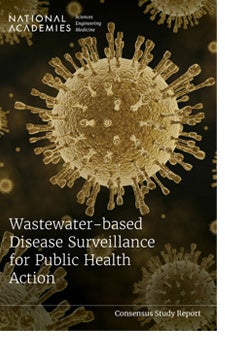Hopkins co-authors National Academies’ report
A new report this month from the National Academies of Sciences, Engineering and Medicine is bolstering the case for a national wastewater surveillance system that can monitor and detect public health threats using some of the methods and standards Rice faculty established in partnership with the Houston Health Department during the COVID-19 pandemic.

The report was co-authored by Loren Hopkins, the Houston Health Department’s chief environmental science officer and a professor in the practice in Rice’s Department of Statistics, who was chosen to participate in the blue-ribbon study based on pioneering research that she and Rice faculty colleagues Katherine Ensor and Lauren Stadler spearheaded early in the pandemic.
When people are sick, their feces contains genetic traces of what ails them. Hopkins, Ensor and Stadler realized gene sequencing technology had progressed to the point where it would be feasible to track the spread of the disease by testing samples from city sewers. An April 2020 grant from Rice’s COVID-19 Research Fund got them started, and by early fall city officials were using analyses from tests performed at Rice to detect coronavirus outbreaks in neighborhoods where the disease was just beginning to spread.
The work established Houston as a leader in the field, and the Centers for Disease Control made that official last fall when it awarded a first-year grant worth $1 million to a Rice-city partnership to establish Houston Wastewater Epidemiology, one of two “centers of excellence” in the CDC’s National Wastewater Surveillance System training and research program.
CAREER Awards coup continues
Stadler, whose lab played a critical role in Houston’s COVID-19 wastewater monitoring program, also made news this month, winning Rice’s third CAREER Award of 2023 from the National Science Foundation. The awards include a five-year research grant, and despite the fact that NSF only awards about 500 of the grants across all disciplines each year, Rice faculty have won one or more each year since 1997, including a school-record 12 in 2022. Almost 30% of Rice’s tenure-track faculty in science and engineering have received the distinction.
Stadler’s CAREER Award research was highlighted in Engineering News, and Rice News has features about the 2023’s other winners, theoretical biological physicist Evelyn Tang and bioscientist Kory Evans.
NEWT wins DOE funding for desalination research
A multi-institutional team led by researchers at the Rice-based Nanotechnology-Enabled Water Treatment Center (NEWT) has won Department of Energy funding to demonstrate and validate a sensing and monitoring system at California’s Orange County Water District for the dynamic characterization biofouling, mineral scaling and organic fouling of reverse osmosis water filtration membranes. The research findings will be combined with data from pilot and full-scale reverse osmosis systems to train next-generation machine learning and artificial intelligence models to better forecast and mitigate fouling and scaling.
The research is funded through the National Alliance for Water Innovation (NAWI) consortium and is part of NEWT’s ongoing effort to develop innovative desalination technologies that can tap nontraditional water sources.

